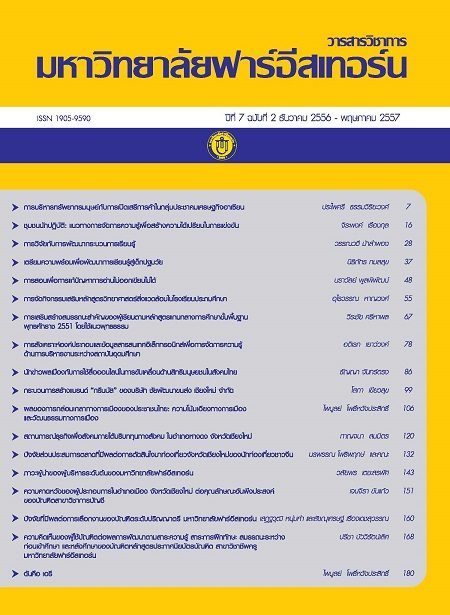ภาวะผู้นำของผู้บริหารระดับต้นของมหาวิทยาลัยฟาร์อีสเทอร์น
Main Article Content
Abstract
การวิจัยครั้งนี้มีวัตถุประสงค์เพื่อศึกษาภาวะผู้นำและศึกษาปัญหาและความต้องการในการพัฒนาภาวะ ผู้นำระดับต้นของมหาวิทยาลัยฟาร์อีสเทอร์น ประชากรที่ใช้ในการวิจัย ได้แก่ ผู้ดำรงตำแหน่งหัวหน้าภาควิชาและหัวหน้า หน่วยงาน จำนวน 32 คน เครื่องมือที่ใช้เป็นแบบสอบถามประมาณค่า 5 ระดับ วิเคราะห์ข้อมูลโดยใช้ค่าร้อยละ ค่าเฉลี่ย ส่วนเบี่ยงเบนมาตรฐาน และความเรียง
ผลการวิจัยพบว่าหัวหน้าภาควิชาและหัวหน้าหน่วยงานของมหาวิทยาลัยฟาร์อีสเทอร์น ส่วนใหญ่ดำรง ตำแหน่งบริหารมาแล้วมากกว่า 2 ปี และเคยได้รับการอบรมเกี่ยวกับภาวะผู้นำและการบริหารงานมาบ้างแล้ว โดยมีคุณลักษณะผู้นำที่มีสุขภาพแข็งแรงและให้ความสนใจด้านบุคลิกภาพของตนเองอย่างสม่ำเสมอ มีความรับผิดชอบงาน มีความเคร่งครัด จริงจัง ในการตรวจสอบหรือนิเทศงานเพื่อให้งานมีประสิทธิภาพ ตลอดจนมีการแสดงออกโดย การทักทาย เป็นกันเอง ให้ความช่วยเหลือในด้านต่างๆ แก่ผู้ใต้บังคับบัญชา และเข้าร่วมกิจกรรมหรือปฏิบัติงานต่างๆ โดยไม่คำนึงถึงเวลาหรือค่าตอบแทน อีกทั้งมีการแสดงความชื่นชมในความสำเร็จของผู้ใต้บังคับบัญชา ด้านการ บริหารงานพบว่า เปิดโอกาสผู้ใต้บังคับบัญชามีส่วนร่วมในการแสดงความคิดเห็นและตัดสินใจแก้ปัญหาต่าง ๆ ในการประชุม และมีการมอบหมายอำนาจให้อยู่ในขอบเขตด้วยทุกครั้ง ด้านความต้องการพัฒนาภาวะผู้นำ พบว่า ผู้บริหารระดับต้นต้องการความรู้ด้านทฤษฎีการบริหารงานแบบมีส่วนร่วม ทักษะการสร้างแรงจูงใจ การตัดสินใจ และเทคนิคการควบคุม นอกจากนี้มีข้อเสนอแนะสำหรับมหาวิทยาลัย คือ ควรส่งเสริมให้บริหารระดับต้นมีความรู้ เกี่ยวกับกลยุทธ์การวางแผน การบริหารความขัดแย้ง ตลอดจนการเตรียมความพร้อมการบริหารงานกับองค์กร ต่างชาติ และการเสริมสร้างทักษะภาษาอังกฤษ ตลอดจนเทคนิคการโน้มน้าวผู้ใต้บังคับบัญชา และเมื่อได้รับการ คัดเลือกเข้าสู่ตำแหน่ง ควรมีการนำเสนอแนวความคิดหรือมุมมองในการบริหารงานให้ผู้ใต้บังคับบัญชารับทราบ ตลอดจนจัดหลักสูตรฝึกอบรมเพื่อเสริมสร้างภาวะผู้นำ และสนับสนุนให้มีการศึกษาดูงานเพื่อแลกเปลี่ยนเรียนรู้ กับองค์กรภายนอก
The aim of this research is to study leadership, problems and demands in the development of lower level administrators leadership of the Far Eastern University. Populations are heads of academic departments and heads of supporting-staff offices, totaling of 32 persons. Using a 5- point rating scale questionnaires, data were analyzed using statistical methods e.g., percentage, means, standard deviation, and essay.
The research findings revealed the followings; Most of academic departments’ heads and heads of supporting-staff offices of The Far Eastern University had been holding their positions for more than two years and already had some trainings on leadership and administrative skills. These leaders possessed healthy leadership characteristics and always paid attention to their personalities. They took their responsibilities seriously. They were determined and always aimed for efficient performance, as well as expressions of friendly greetings, giving assistances on several matters to subordinates, and joining activities regardless of time or extra compensation. They always showed their appreciations on the successes of their subordinates. On the administrative side, they gave their subordinates opportunities to voice opinions and participated in solution-finding situations in meetings, giving them authorization within their power. On the demand for leadership development, they needed knowledge on theories of participatory management, motivational skill development, decision making, and controlling techniques. As for recommendations to the university, The Far Eastern University should help developing them in the area of knowledge of strategic planning, conflict management, readiness preparation for management with foreign organizations, and enhance English skill, as well as techniques to persuade subordinates. Upon being selected to take the position, they should present their ideas or views in management to their subordinates. The Far Eastern University should also provide training courses to enhance leadership skills for these young administrators as well as venues to enhance their management skills with other organizations.
Article Details
1. Any views and comments in the Journal of Social Innovation and Lifelong Learning are the authors’ views. The editorial staff have not to agree with those views and it is not considered as the editorial’s responsibility.
2. The responsibility of content and draft check of each article belongs to each author. In case, there is any lawsuit about copyright infringement. It is considered as the authors’ sole responsibility.
3. The article copyright belonging to the authors and The Far Eastern University are copyrighted legally. Republication must be received direct permission from the authors and The Far Eastern University in written form.

